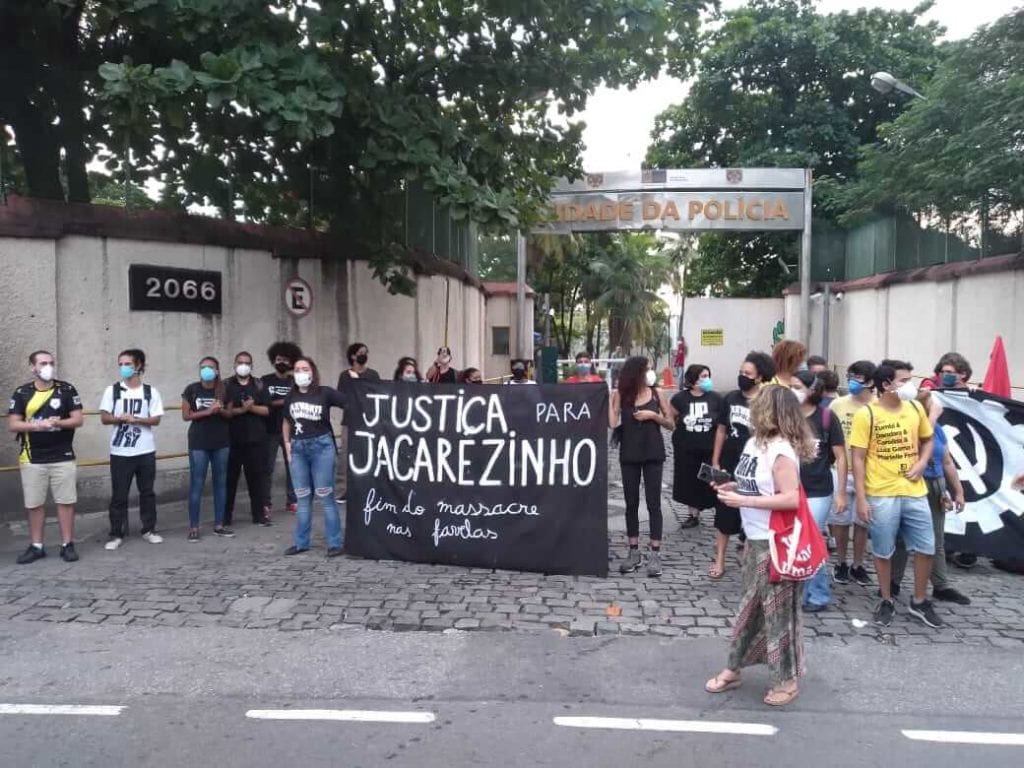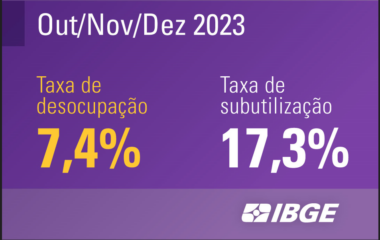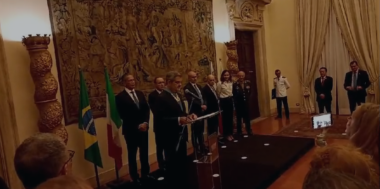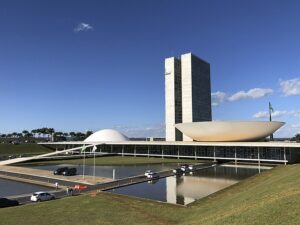Operation in the Jacarezinho favela was the most lethal in the history of Rio de Janeiro
with 25 dead, including one policeman and 24 civilians. In addition to the dead, two people were injured by stray bullets inside the train car that passes close to the favela

by João Marcelo
SAO PAULO – On Thursday, the 6th, the most lethal police operation in the history of Rio de Janeiro took place, with 25 dead, including one policeman and 24 civilians. In addition to the dead, two people were injured by stray bullets inside the train car that passes close to the favela.
The massacre had worldwide repercussions, being reported by newspapers around the world. The Human Rights Office of the United Nations (UN) charged, this Friday, the 7th, an independent investigation into the police operation in the Jacarezinho favela.
This morning there was a protest organized by the March of the Favelas at the entrance of the community. In an interview with Dire agency, the professor of sociology and human rights activist, Pedro Mara said that he was at the demonstration and that the atmosphere in the community is of a lot of fear, tension and strong police presence. “I passed through the favela and what I saw was a climate of tension, a lot of fear, people are still counting the dead and the missing.” said the teacher.
UN Human Rights Spokesperson Rubert Colville said at a press conference in Geneva, Switzerland that there is a history of disproportionate and unnecessary use of force by the police. “We ask the prosecutor to conduct an independent and thorough investigation of the case in accordance with international standards. It is particularly worrying that the operation took place despite a 2020 Supreme Court (STF) decision restricting police operations in slums during the Covid-19 pandemic, “says Colville.
The spokesman also warned the Brazilian authorities that the use of force should be applied when strictly necessary, respecting the principles of legality, precaution, necessity and proportion. “Lethal force should be used as a last resort and only in cases where there is an imminent threat to life or serious danger.”
The professor points out that state police operations the way they are done are a problem. “Most police operations in the state in the name of public security promote barbarism, promote slaughter. Another assessment that must be made is that this was the most lethal operation and the worst is the justification of the civil police, that the problem of public security in Rio de Janeiro is judicial activism. What he calls activism are the very rules that the Supreme Federal Court did about operations in the favelas during the pandemic ”.
Mara adds that the authorities’ assessment caught his attention. “At no time did the security forces or the governor say the operation was a disaster, although nowhere in the world is it reasonable for a police operation to result in 24 deaths.”
Residents reported the operation in videos and there were many reports of human rights violations. Some people claimed that police raided homes without a warrant, as well as reports of torture by the public security forces. A video that circulates on the internet shows police officers entering a house and shooting a lying man who is apparently surrendered
At a news conference held on Thursday, the delegates responsible for the operation said that trafficking in the region attracted minors to crime and even banned dating. And that the operation complied with all protocols required by decision of the Supreme Federal Court (STF), restricting operations in favelas during the pandemic to exceptional cases. The delegate also said that he did not consider that there were errors or excesses in the operation, but that the result is not to be celebrated. “We are not celebrating (…) On the other hand, the Civil Police will not shy away from making sure that the good society has its right to come and go,” said Oliveira.
Another responsible delegate, Felipe Curi, of the DGPE (General Department of Specialized Police), referred to dead suspects as “homicides” when he mentioned that they were shot in exchange for shots with the agents. “There are no suspects here. We have criminals, murderers and drug dealers,” he said. “What causes a lot of pain in us is the death of our colleague”, added the delegate.
L’ATTIVISTA A RIO: “IN FAVELA CONTANO MORTI E SCOMPARSI”
di João Marcelo
SAN PAOLO DEL BRASILE – “Oggi sono stato nella favela; c’è tensione, c’è paura, gli abitanti stanno ancora contando i morti e gli scomparsi”: così all’agenzia Dire Pedro Mara, attivista per i diritti umani, insegnante scolastico e dottorando in sociologia, all’indomani dell’operazione di polizia che ha causato almeno 25 morti a Jacarezinho, a Rio de Janeiro.
L’intervista si è tenuta dopo una manifestazione di protesta degli abitanti, la Marcha das Favelas, all’ingresso del quartiere. Ingente, ha sottolineato Mara, lo spiegamento di forze dell’ordine.
Nel corso dell’operazione, che sarebbe stata finalizzata allo smantellamento di una rete di narcotrafficanti, sono rimasti uccisi almeno 24 civili e un agente di polizia. Due altre persone sono state raggiunte da proiettili e ferite mentre erano a bordo di un treno in transito presso la favela.
A colpire Mara anche il fatto che finora non ci sono state ammissioni di errori o di responsabilità da parte di funzionari e dirigenti. “Né le forze di sicurezza né il governatore hanno riconosciuto che l’operazione è stata un disastro – ha detto l’attivista – nonostante in nessun Paese al mondo è accettabile che un intervento di polizia provochi oltre 20 morti”.
Sui fatti di ieri l’Alto commissariato delle Nazioni Unite per i diritti umani ha chiesto l’avvio di un’inchiesta. “È particolarmente preoccupante – ha detto il portavoce Rupert Colville – che l’operazione si sia svolta nonostante una sentenza della Corte suprema che nel 2020 aveva posto vincoli agli interventi di polizia nelle favelas durante la pandemia di Covid-19″.
OPERAÇÃO NA FAVELA JACAREZINHO FOI A MAIS LETAL DA HISTÓRIA DO RIO DE JANEIRO
por João Marcelo
SAO PAULO – Na quinta-feira, dia 06, aconteceu a operação policial mais letal da história do Rio de Janeiro, com 25 mortos, sendo um policial e 24 civis. Além dos mortos, duas pessoas foram feridas por balas perdidas dentro do vagão de um trem que passa próximo à favela.
O massacre teve repercussão mundial, sendo noticiado por jornais em todo mundo. O escritório de Direitos Humanos da Organização das Nações Unidas (ONU) cobrou, nesta sexta-feira, dia 7, uma investigação independente sobre a operação policial na favela do Jacarezinho.
Na manhã de hoje houve um protesto organizado pela Marcha das Favelas na entrada da comunidade. Em entrevista à agência Dire o professor de sociologia e ativista pelos direitos humanos, Pedro Mara contou que esteve na manifestação e que o clima na comunidade é de bastante medo, tensão e forte presença policial. “Passei por dentro da favela e o que eu vi foi um clima de tensão, muito medo, as pessoas ainda estão contando os mortos e desaparecidos.” disse o professor
O porta-voz dos Direitos Humanos da ONU, Rubert Colville, disse em entrevista coletiva em Genebra, na Suíça, que há um histórico de uso desproporcional e desnecessário da força pela polícia. “Pedimos que o promotor conduza uma investigação independente e completa do caso de acordo com os padrões internacionais. É particularmente preocupante que a operação tenha ocorrido apesar de uma decisão do Supremo Tribunal Federal (STF) de 2020 restringindo as operações policiais em favelas durante a pandemia de Covid-19″, afirma Colville.
O porta-voz ainda fez um alerta às autoridades brasileiras para que o uso da força seja aplicado quando estritamente necessário, respeitando os princípios da legalidade, precaução, necessidade e proporção. “A força letal deve ser usada como último recurso e apenas em casos em que há ameaça iminente à vida ou de um sério perigo”.
O professor ressalta que as operações policiais do estado do jeito que são feitas são um problema. “A maioria das operações policiais no estado em nome da segurança pública promovem barbárie, promovem chacina. Outra avaliação que deve ser feita é que essa foi a operação mais letal e o pior é a justificativa da polícia civil, de que o problema da segurança pública do Rio de Janeiro é o ativismo judicial. Isso que ele chama de ativismo são as próprias regras que o Supremo Tribunal Federal fez sobre as operações nas favelas durante a pandemia”.
Mara ainda acrescenta que a avaliação das autoridades chamou a sua atenção. “Em nenhum momento as forças de segurança ou o governador disseram que a operação foi um desastre, embora em nenhum lugar do mundo seja razoável que uma operação da polícia resulte em 24 mortos.”
Os moradores relataram em vídeos a operação e houveram muitas denúncias de violações dos direitos humanos. Algumas pessoas afirmaram que os policiais invadiram casas sem mandado da justiça, além de denuncias de tortura de execução por parte das forças de segurança pública. Um vídeo que circula na internet mostra policiais entrando em uma casa e atirando em um homem deitado que está aparentemente rendido
Em entrevista coletiva realizada na quinta-feira, os delegados responsáveis pela operação disseram que o tráfico da região aliciava menores para o crime e que até proibiam namoros. E que a operação cumpriu todos os protocolos exigidos por decisão do Supremo Tribunal Federal (STF) restringindo operações em favelas durante a pandemia a casos excepcionais. O delegado também disse não considerar que houve erros ou excessos na operação, mas que o resultado não é para ser comemorado. “Não estamos comemorando (…) Por outro lado, a Polícia Civil não vai se furtar de fazer com que a sociedade de bem tenha seu direito de ir e vir garantido”, afirmou Oliveira.
Outro delegado responsável, Felipe Curi, do DGPE (Departamento Geral de Polícia Especializada), referiu-se a suspeitos mortos como “homicidas” ao citar que foram baleados em troca de tiros com os agentes. “Não tem nenhum suspeito aqui. A gente tem criminoso, homicida e traficante”, disse. “O que causa muita dor na gente é a morte do nosso colega”, completou o delegado.
Le notizie del sito Dire sono utilizzabili e riproducibili, a condizione di citare espressamente la fonte Agenzia DIRE e l’indirizzo www.dire.it










